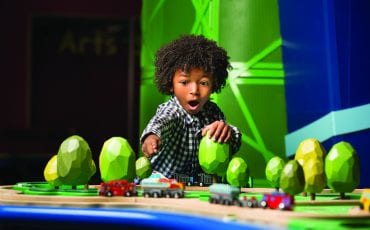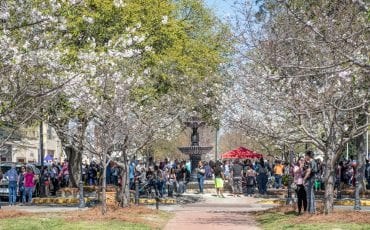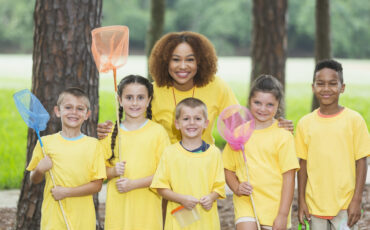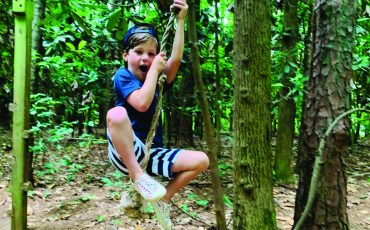5 Helpful Organizations Connecting Atlanta Communities

Odyssey Atlanta | Chris Aluka Berry/Ben Rose Photography
According to a report from U.S. News & World Report, metro Atlanta ranks 55 on their list of top cities in the country to live in in 2021-2022. Their rankings are based on quality of life, home prices and the job market, among other things.
While Atlanta is a great place for families to live, there are pockets of our population for which quality of life doesn’t rank very high. Food insecurity, transitional housing and access to educational and extracurricular activities is something many of us take for granted, but for our neighbors can be a harsh reality. And, with the recent shutdowns of schools and other service providers due to the pandemic, these gaps have widened. The good news is that the Atlanta community has many resources that help fill these needs to help ensure that people in our community are supported.
“We are an integrated society and should work together as such,” says Amy Zeide, Founder & Co-Executive Director of Creating Connected Communities (CCC), a non-profit that provides life-enhancing programs for children experiencing hardship by empowering teens to become engaged community leaders and volunteers. “People think of certain areas, like the suburbs, of not having these realities, but that is perception versus reality.” There are many Title 1 schools in North Fulton County and East Cobb, which people traditionally think of as affluent areas of town. Zeide notes that many of the teens that work with CCC go to school with peers who are facing food insecurity and have no idea.

Second Helpings Atlanta
Knowledge is Power
Being aware of this often-silent problem is key to being part of the solution as Christie Maloch, Co-Director of Snax Sax for Kids, a Ministry of Embry Hills UMC, has discovered over the past six years. Snax Sax works in partnership with the Atlanta Community Food Bank and five Title 1 schools to provide approximately 200 children with healthy, shelf-stable food over the weekend. “About 1 in 7 kids are food insecure in our zip code,” Maloch says.
Second Helpings Atlanta is a non-profit focused on rescuing food to provide meals to food insecure families. “In 2021 alone, our team was able to rescue 3,611,607 pounds of fresh, surplus food to create 3,009,672 equivalent meals provided from rescued food,” shares Executive Director Andrea Jaron. The pandemic increased the number of families in need of food while presenting challenges to SHA’s model for providing services. “When our volunteer drivers were sidelined due to COVID, the organization partnered with Goldberg’s Fine Foods who ‘loaned out’ their employees to temporarily drive routes, so that those in need still received the support needed,” says Jaron.
During COVID, the Snax Sax team also realized that they could not serve their community in the traditional way since the DeKalb County public schools were closed, so they started a weekly family meal pick-up process instead. “This was only time we got to interact with families,” says Maloch. “It helped us realize we needed to translate our communication to Spanish because so many of the people don’t speak English as a first language.”

Snax Sax for Kids
Family Matters
Supporting the whole family is something Erica Gwyn, the Head of School at Seven Oaks Academy in Gwinnett County, is acutely aware of and was the basis for her to transition the academic focus of her school to Montessori learning. “In 2019 in our county, 52% of students starting kindergarten were not kindergarten ready,” notes Gwyn. “This led me to start research to solve this problem.” She realized that many of her students come from Spanish-speaking homes and/or ones with socio-economic challenges. “It’s up to us to meet the needs of our community and support them,” says Gwyn.
By converting her program to Montessori, she has been able to break down barriers and create a space in which every child can learn and spark creativity. The Montessori approach allows the students to learn self-regulation skills. “The program helps children identify the emotion and allows the teachers to help students sort out those emotions and create meaningful relationships with the students,” says Gywn. “We have also been able to teach the parents some of these basic tenants of the program to connect the school learning to the home environment.”
Access to quality educational experiences, like those Gwyn is providing, is critical to helping children overcome circumstances over which they have no control. The facts for those in struggling communities is that incarceration rates are higher, life expectancies are lower, and academic performance is far behind students in higher socio-economic environments. Odyssey Atlanta is also trying to bridge this gap; the non-profit strives to reinforce the academic performance by supporting the whole child. “Our project-based learning model brings learning to life,” shares Executive Director Jeff Cohen. “Our first graders learn about fish by visiting the Georgia Aquarium, designing their own fish and then designing a class aquarium.”
Odyssey Atlanta supports students in first through twelfth grades with the goal that each student graduates from college. During the pandemic, participating families received learning kits, food, school supplies, books, laptops and hot spots so that learning could remain a focus. This summer, they are back at capacity serving 375 students.
When we come together as a community to support one another, we all benefit from the results. Teaching our children about the people around them and ensuring they understand how they can help from a young age can create real change. “It’s not just about resource distribution,” says Zeide. “The real impact is around the community and relationships. That is what has long-lasting impact.”
How You Can Help
Be aware. “You need to be aware of community needs to be part of that support network,” says Zeide. “Explain to your kids who are the people in our community and what is happening right outside of our doors.” Maloch says there are signs, including irritability and hoarding food, you can look for if you suspect a child that you know is food insecure.
Talk to your kids. There are age-appropriate ways to make your children aware of what their peers may be facing. “You can ask them, ‘Do you ever go to school and not eat breakfast… imagine that Friday lunch at school was your last meal until Monday morning. How would you feel?’” says Maloch. These at-home conversations are where you can stress understanding and teach empathy to your children. “The more connection our young people feel to others, the more this idea of giving and being part of the community will be part of who they are as adults,” says Zeide. “They can take this passion with them to wherever they live in the next steps of their lives.”
Get involved. Outreach work is more appropriate for older children – middle school and up – but there are ways the whole family can help. Become a driver for Second Helpings Atlanta (and have your kids ride along), purchase supplies, advocate for educational equality, or ask your school if there are communities in need in your area. There are also many non-profits you can support by making donations that help them positively impact our community.
-Tali Benjamin







